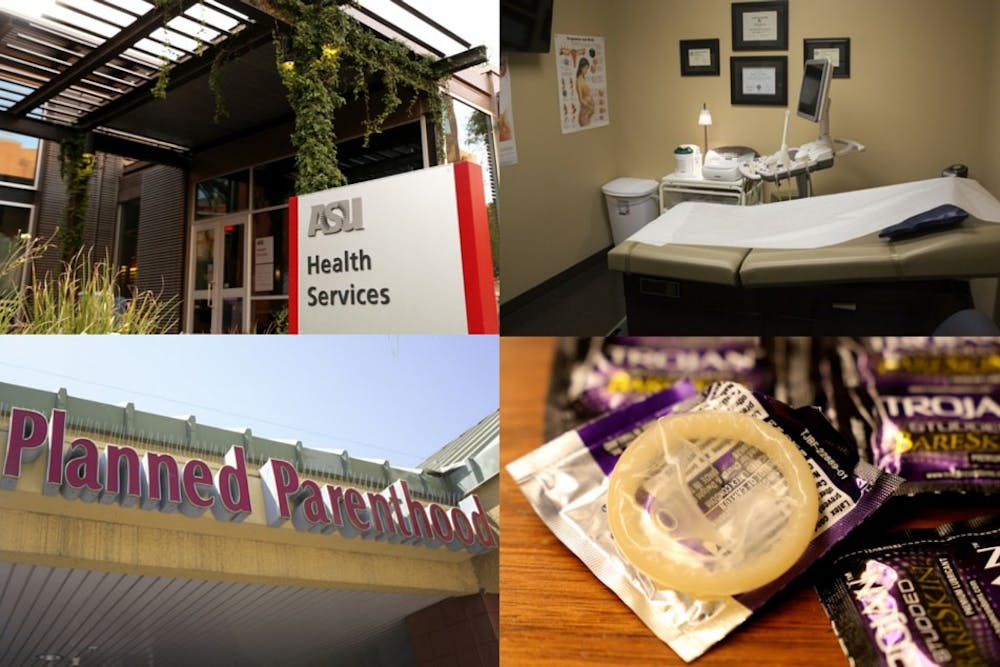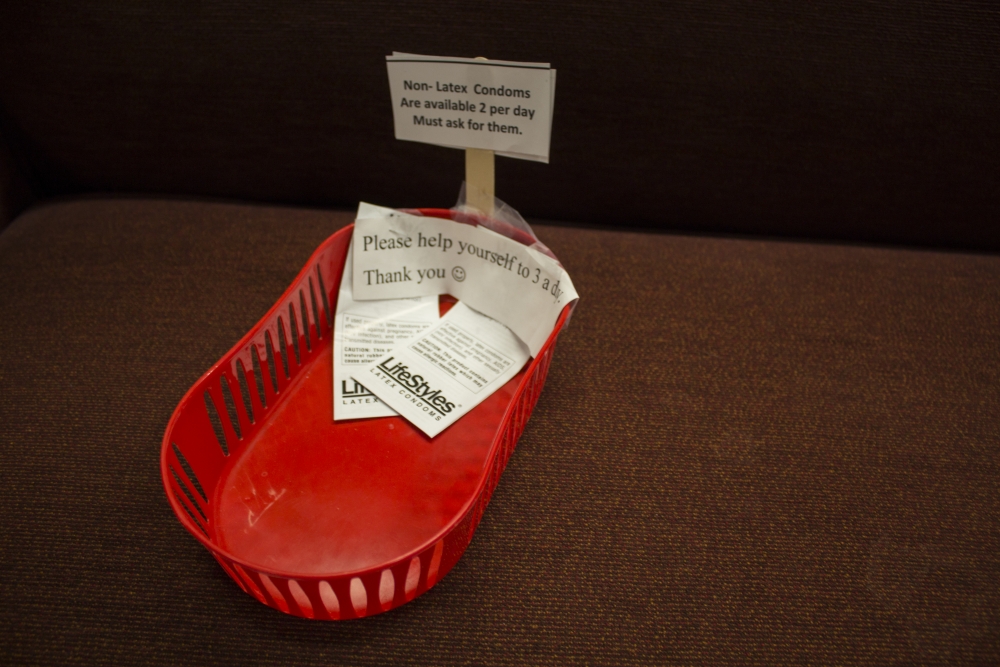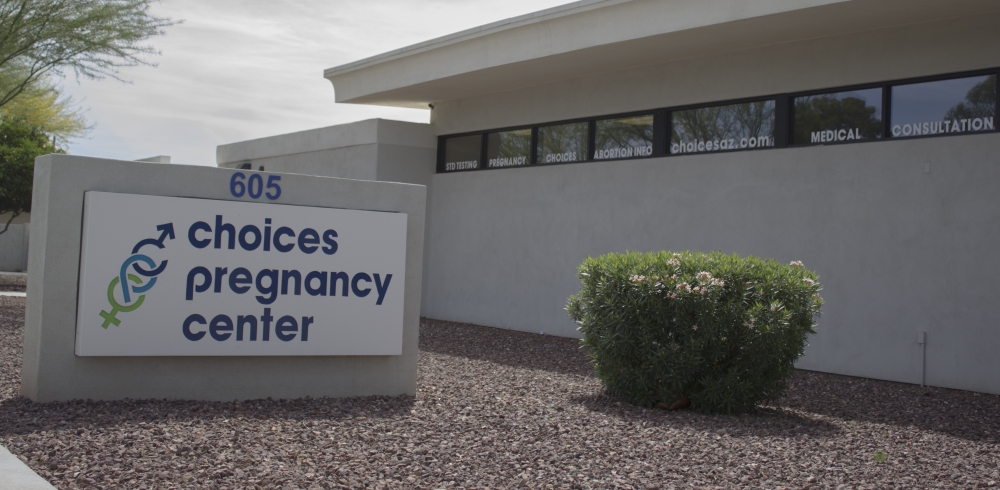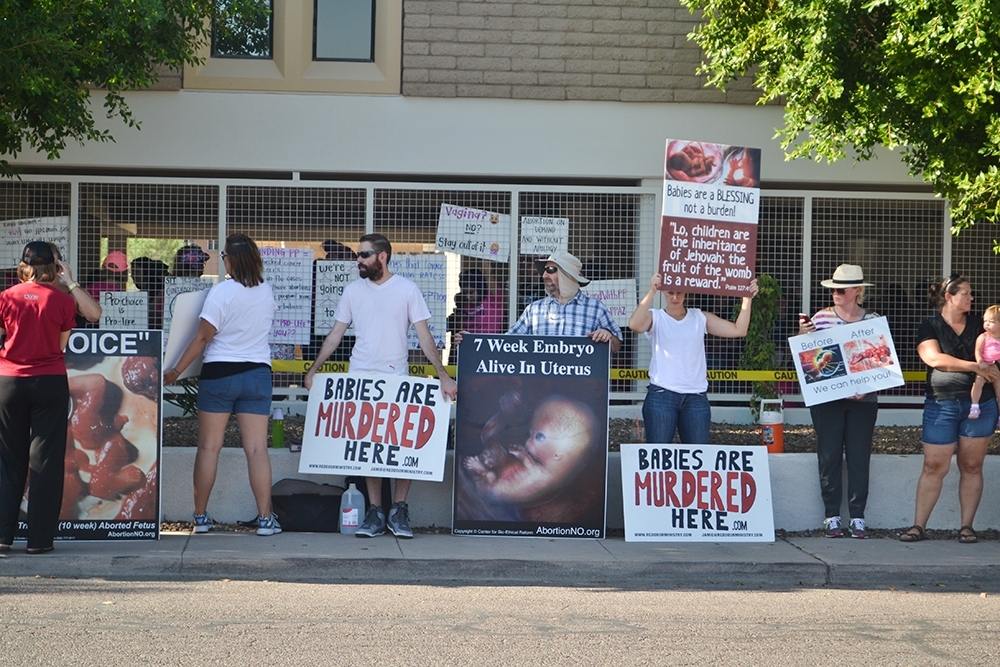While ASU Health Services continues to improve sexual health awareness and treatment for ASU students, a separation of beliefs over a woman's right to choose and the proper way to handle student pregnancies is creating tension on campus.
This issue is heating up not just at ASU, but around the country: Planned Parenthood and abortion have yet again become a hot button talking point in this year’s election cycle. Due to a growing spotlight on these topics, trends in sexual health on college campuses are a prominent subject of new surveys and research.
In the 2015 Trojan Sexual Health Report Card, ASU ranked No. 56 on the listings. And while this isn’t in the top 10, it’s an improvement from its rank as No. 89 in 2011.
Regardless of politics, sexual health is a controversial topic on campus, bringing an assortment of conflicting views together right here on campus.
ASU Health Services
At the forefront of all this is ASU Health Services, a place that not only cares for sick students, but also provides information that promotes healthy sexual practices.
Bert Sperling, the lead researcher for Sperling’s Best Places, the company that conducted the Trojan survey, said the accessibility of ASU’s health centers and contraception helped the school rank up on Trojan's listings.
“Some health centers require students to make an appointment, but not at Arizona State University, where students can drop in and be seen because you can’t always plan ahead too far as a student,” he said. “Contraception both for male and female is also quite excellent, especially for male contraceptives.”
Condoms are given out for free at ASU Health Services, other forms of contraceptives are "open for discussion," depending on the individual.
ASU Counseling Services and Health Services Associate Vice President Aaron D. Krasnow said many other sexual health services are available at ASU, such as primary care, walk-in acute care, women’s health and laboratory services.
"For sexual health concerns, depending on the need, a student can meet with a provider to discuss issues or symptoms, contraception options, get STI and pregnancy testing and education about sexual health," he said.
Sperling pointed to the ASU Health Services website as one area ASU could improve. The site scored a six out of ten on the survey’s ranking scale.
“It could have more information that is produced by the Student Health Center on there that provides information so students don’t have to go to a different website,” he said. “If you go to some of the top rated schools and look at their websites and look at the breadth and the depth of knowledge provided, there is a stark contrast.”
Meanwhile, Krasnow said he was unaware of this information.
"Since I haven't talked to Mr. Sperling about it, that's news to me," he said. "What I can say is that we will continue to seek to improve access to sexual health information and services."
Although no specific number of how many students come to ASU Health Services for sexual health needs was given, Krasnow said ASU has a process for handling situations when students should discuss pregnancy.
"Any student who talks to us about contraception, family planning and pregnancy will be given information about our services and if needed and desired, connection to any community medical services," he said. "ASU Health services does not provide obstetrics."
ASU Health Services does not take a political stance on sexual health and instead focuses on what is best for the student population. That's where students come into play.
ASU Students For Life
Secondary education and chemistry junior Jennifer Whitton is president of ASU Students For Life, a pro-life student organization founded in 1973 when the landmark U.S. Supreme Court case Roe v. Wade ruled that women have a right to an abortion.
Whitton said the goal of the club is to advocate for the pro-life movement.
“That means we’re advocating for laws, practices and a culture that respects life from conception all the way to natural deaths,” Whitton said. “We have a main focus on abortion because that’s what is mostly seen at our campus. It’s what our students are mostly dealing with, and we want to educate about that specifically.”
Advocating for this pro-life movement was never a facet of Whitton’s life until her senior year of high school, during which she attended a conference that touched on women’s rights and abortion. She said it created the spark that led to her becoming a leader within this movement at ASU.
“I think it’s sad for the mothers who lose their children because of (abortion), and it’s sad for the children who lose their lives because of it,” she said. “There was just a wake up call at this conference that said, ‘You need to do something about this, Jen.’”
One major development created under the ASU Students For Life organization in 2014 is the ASU Pregnant on Campus Initiative.
Led by English linguistics junior Jackie Welsh, this club seeks to assemble all relevant information about pregnancy resources, and use them as a tool to help pregnant students on campus.
“I’ve always had a lot of empathy for women that become pregnant and feel like it’s the end of the world – that their college and education will drop away, their boyfriend will fall away and their family won’t support them,” Welsh said. “I wanted to step up my game of being a supporter of women in that situation, and find out what’s out there for them.”
The Pregnant on Campus Initiative provides information on student pregnancy issues, such as how to access pregnancy tests and breastfeeding equipment on campus. The group also recommends the non-profit pregnancy and medical clinic Aid To Women Center for students in these situations.
Katrina Winn, the outreach coordinator for Aid To Women Center, said many ASU students are coming into the two clinics, but the main goal is to help with pregnant students who come from lower socio-economic backgrounds who might not qualify for insurance.
“Other centers just maybe aren’t able to, but we’re able to provide the full scope and care," she said.
However, Aid To Women Center does not provide any type of service for abortions, but does provide counseling services to women figuring out whether they would like to make that choice.
“We want to make sure they are taken care of,” Winn said. “We do not provide a referral for that, but we will give information about it, like what the ramifications are, what the health risks are — all of that.”
Another option near the Tempe campus is Choices Pregnancy Center, a clinic with similar goals that offers counseling services and ultrasounds. The clinic shares the same stance on abortion as the Aid To Women Center.
Nurse manager of Choices Pregnancy Center Michelle Tussing said the goal of the center is to provide women with all of their options, and not just limit them to one.
“Abortion can be hard on women in this age of informed consent,” she said. “We want to give as much information as possible and give them all the options. When a woman is feeling trapped, abortion seems like the only choice.”
Tussing also said she has witnessed women suffer from depression and suicidal thoughts following an abortion.
“We see all the time women that come here that wish they could just undo it,” she said.
Winn added that having an abortion can result in a form of post traumatic stress disorder and be emotionally traumatizing for a woman.
“I’ve had women come to me crying, sobbing about a choice they made many years ago, and they were told it was OK to make this choice,” she said. “It takes a form of PTSD. We do see it and diagnose it.”
VOX: Voices For Planned Parenthood
However, civil engineering junior Emily Lauber pointed to a study from July 2015 by the Bixby Center for Global Reproductive Health at University of California San Francisco’s School of Medicine that concluded 95 percent of women who have had abortions do not regret it.
Lauber is also the president of VOX: Voices for Planned Parenthood at ASU, a gender inclusive, pro-choice and feminist organization that supports the national sexual health clinic in any way it can.
She said that while some may be traumatized after having an abortion, most are not.
“The idea that people are having these abortions and are traumatized, that is undoubtedly true for a small portion of people, but the large majority of people having abortions feel relief after having the abortion after five years,” she said.
VOX was not always political, but when false videos of fetus-harvesting leaked, Lauber said it was time to take even more action in their support of Planned Parenthood.
“We’ve worked a lot more this year to be a little more political and a little more direct in our supporting of Planned Parenthood, more abortion positive and more campaigns focused on sexual awareness,” she said. “We’re much more connected to Planned Parenthood now then we were in previous years."
The sexual health clinic that has become a household name for abortion and women’s rights offers everything these other clinics do, but also provides contraception and abortion options.
Clinics like Aid To Women Center and Choices Pregnancy Center are what’s called a Crisis Pregnancy Center, Jodi Liggett, vice president of public affairs for Planned Parenthood Arizona, said.
She said these clinics are hit or miss when it comes to taking care of a woman during pregnancy.
“I think there are certainly sincere folks (at these clinics) who just want to help women in a tough situation, and we have no quarrel with that,” she said. “What we object to is some of the other folks who call themselves crisis pregnancy centers, but their sole objective may be really just to talk a woman out of her decision instead of just offering to help and letting her know what all her options are.”
Liggett said Planned Parenthood counsels women on all of their options during pregnancy, just like other pregnancy centers. However, the difference is that Planned Parenthood discusses abortions.
She also said there is a focus on raising awareness about sexual health that makes Planned Parenthood more than just a go-to abortion clinic.
“That service, although we’re proud to provide it and not embarrassed to provide it, it’s a small portion of what we do,” she said. “Almost all of what we do is to ensure people’s health, and especially to prevent unplanned pregnancies which are really life de-railers for young women and men.”
A clash of ideals
Welsh, the chair of Pregnant on Campus, said its group has tried to work together with VOX, but it hasn’t quite worked out because of the groups' differences.
“Some members are open to working with us, and others are skeptical of us and are not open to working with us which is unfortunate,” she said. “We’re both passionate about these issues and these people even though we have different perspectives. We could be strong together.”
Lauber said she brought the option of supporting the Pregnant on Campus Initiative to the rest of VOX, but the club was not interested.
“We disagree on some of the fundamentals,” she said. “We believe that if you want to support pregnant parenting students, you should discuss all the options with them. We just haven’t seen that happen yet from that group.”
Welsh argued that because of how political the issue has become in this year’s election cycle, the topic of abortion contributes to friction between the groups.
“It’s further polarizing us and preventing us from understanding the other’s side,” she said. “Ultimately, it’s worse for the students that we both want to reach because our efforts can’t be stronger together and reach more people.”
Lauber brings up the resistance women face when having an abortion. She said that because it’s a constitutionally protected right, she shouldn’t have to see protesters telling her she’s “going to hell” whenever she goes to a Planned Parenthood.
“I think that is extremely harmful because they are attacking other people,” she said. “They’re making their own life decisions where we are pro-choice, but if someone were to tell me that they never wanted an abortion, I would totally support that."
But Welsh said the opposition she faces for being a part of the pro-life movement is also just as bad.
“People have a lot of misconceptions about you,” she said. “As humans, our reputations are very important to us. When you think that someone else who could be close to you, or who could just be a peer could be thinking badly about you because they misunderstand you, I think that’s scary."
The difference here is that ever since the videos which claimed Planned Parenthood sold fetal parts came out last summer, violence toward Planned Parenthood has increased. It all culminated with a shooting at a Colorado Planned Parenthood, where three people were killed.
Still, the pro-life side has faced suppression of its message as well, though with less violence. ASU Students For Life President Whitton recalls a time when a public event of the groups had to finish early because people were complaining about it.
"We went through great lengths to be able to get the permission to be able to talk, and even though we had permission, we had our talk blocked off early," she said. "It sometimes feels like people just won’t listen to my side of the story as well."
However, Welsh said she is still optimistic about working with opposing groups in the future and doesn't want to rule it out as a possibility.
"I don’t want to make it seem we’re mad at them because we have open arms," she said. "We do hope to work with them."
Lauber also said the relationship between VOX and ASU Students For Life is not hostile, and that their interactions are cordial and friendly.
"I know several of the leaders in the pro-life group," she said. "Yes, we disagree on some fundamental things, but we can still have pleasant conversations with each other."
She said that because of the continued growth of VOX and its constant schedule of advocacy and events, a partnership with pro-life students is not a necessary objective as of now.
"We’re focused on so many other things that trying to reach for that partnership is not a priority for us right now," she said.
The goal of both clubs is to increase its influence and message by spreading it out to as many people as possible, but the differences are still there. For example, Whitton talked about her view of Planned Parenthood.
"When women think, 'Oh, I’m pregnant,' when they think anything about sexual health or wellness, they think Planned Parenthood," she said. "What we want to try and do is get them beyond that and get them to know that there are other options."
Meanwhile, Lauber said everyone has a right to their own beliefs.
"Don’t have an abortion if you don’t want one," she said. "But if you want one, you should have access to one."
Editor's note: In this article when we refer to "women," we are referring to the portion of the population that can become pregnant. This includes transgender and non-binary individuals.
Reach the investigative reporter at jhgolds2@asu.edu or follow @_jacobgoldstein on Twitter.
Like The State Press on Facebook and follow @statepress on Twitter.







